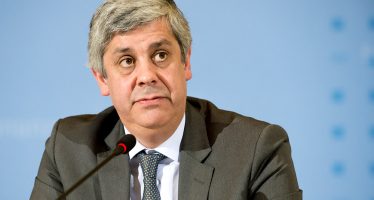Resistance Is Futile as Berlin Backs EU Solidarity

Berlin, Germany
For the third time in her 15-year reign, German Chancellor Angela Merkel has sprung a major surprise and taken the lead whilst others dither. In 2011, she renounced nuclear energy and fossil fuels, promising to put Europe’s largest economy on a sustainable footing. Four years later, Merkel opened the border to welcome around one million refugees from Syria and other war-torn countries.
Cementing her already formidable reputation for political daring, the German Chancellor has again turned 180 degrees and ditched Germany’s long-standing tradition of fiscal rectitude. The country will no longer lecture others on the morality of public thrift. In what is probably to become Merkel’s last hurrah before her retirement, the German government has taken the lead in formulating Europe’s response to the corona pandemic. The stern paymasters of the European Union who, only a decade ago, chastised Greece for its unholy spending habits, have become adorable sugar daddies, showering those less fortunate with words of comfort and generous gifts.
Merkel has always understood, better than most, the supreme importance of the European Union to Germany’s own place and role in the world. In fact, the preamble to the country’s 1949 Basic Law (constitution) specifically mentions the national aspiration to help build a united Europe.
Watching the continent fall into bickering parts as the north-south divide widens to a rift, and sensing an opportunity for Germany to put its considerable clout to good use, Merkel has seized the moment and offers help to fellow EU member states unable to deal on their own with the economic devastation caused by the pandemic.
Prime Minister Mark Rutte of The Netherlands, Merkel’s long-time ally and confidante, has been properly hung out to dry and was told, rather unceremoniously, to stop throwing ‘childish tantrums’. A Dutch recovery plan, supported by the Frugal Four and seconded by the Visegrád Four of Eastern European member states, offering only limited help to Spain, Italy, and other severely affected member states was summarily swept aside as inadequate in light of the present crisis.
Over the coming days and weeks, Germany will have to draw on all its resources to quell a Dutch-led rebellion against EU largesse and strong-arm member states not yet fully exposed to the new wind blowing across the continent back into line.
With the EU split into mostly dissonant quartets, the truly Big Four – Germany, France, Italy, and Spain – ultimately set the tune and follow Berlin which suddenly has become the true capital of Europe. Anyone listening to Rutte or his Austrian counterpart and new BFF Sebastian Kurz may gain the impression that the pandemic has changed nothing, and that life will revert to normal once a vaccine has been found. This is not how Berlin sees the present moment or the immediate future.
Former German Finance Minister Wolfgang Schäuble, a fiscal hawk with impeccable credentials until mere months ago, came out swinging when he bluntly stated that Europe’s future depends on its solidarity. Schäuble reminded his domestic audience of the premise that guides German foreign policy since the birth of the federal republic in 1949: Whatever is good for Europe, is good for Germany. Merkel added that the guiding principle applies not just to peace, but also involves the continent’s economic wellbeing and its prosperity.
According to the view from Berlin, the Frugal Four and their eastern hangers-on are behaving like freeloaders, demanding all the advantages of the single market whilst refusing to help insure its overall health. At home, Merkel faces few political obstacles as she reminds Germans of their historic responsibilities in safeguarding Europe’s future. That message is, however, a much harder sell in countries not burdened by a lingering sense of collective guilt. The stubbornness of the Frugal Four in opening their bulging wallets stems from political realities on the home front. Rutte and Kurz know that their national parliaments are unlikely to agree to any policy initiative that smacks of a fiscal transfer union. However, given Germany’s epiphany, there is little they can do to stop the juggernaut from imposing its will on the EU 27.
On Wednesday, the European Commission unveiled a €750 billion post-corona recovery plan that expands on the €1 trillion already promised by the EU and the previously agreed €540 billion in direct financial support for countries suffering most from the pandemic’s economic fallout. EU Commissioner for Economy Paolo Getiloni said that €500 billion is to be disbursed to member states in the form of non-repayable grants and the remainder as loans. Recipients must only demonstrate a need and are not expected to adopt a structural reform agenda. Conditions, Gentiloni explained, are minimal and payouts are to commence later this year.
Under the proposal, Spain and Italy are the main beneficiaries. Rome is promised a total of €173 billion (€81bn in grants) whilst Madrid may pocket €140 billion (€77bn in grants).
The recovery plan was announced by Commission President Ursula Von der Leyen in a speech before the European Parliament. Though the proposal expands on last week’s Franco-German plan (€500bn), its falls well short of the €1.5 trillion demanded by Italy and Spain and the European Parliament’s own call for a €2 trillion economic rescue deal.
In her speech, Von der Leyen said that the present challenge offers ample opportunity to build a modern, green, and digitised Europe that will help bolster the resilience of its societies and improve the health of the continent’s environment. Budget Commissioner Johannes Hahn spoke of a ‘next generation’ EU and said that the proposals help the continent become more competitive and sovereign.
In a nod to the concerns of more recalcitrant member states, commissioners took pains to avoid mentioning the sourcing of the funds. The Commission proposes to raise the required cash via a one-time issue of bonds backed by member states’ future contributions. Germany now supports the pooling of debt as the least painful way of distributing the financial burden. However, in a position paper released earlier this week, the Frugal Four reject this approach as a portal to the wholesale mutualisation of debt and risk. However, their dismissal was somewhat less categorical than before, leading EU watchers to believe that the holdouts now realise that continued resistance is futile.
You may have an interest in also reading…
Boost R&D to Ensure Sustainable Post-Covid Recovery: Economists
Increased investment in research and development is crucial to post-covid recovery, say economists calling for lasting improvements in the field.
Clash over Eurobonds Widens Rift in Eurozone
Sixteen hours into their videoconference, sleep deprived Eurozone finance ministers early this morning agreed to disagree and try again for
Vietnam – No Stopping Country on the Ascendancy
After two decades of recording full employment and boisterous growth rates, Vietnam has taken a significant, though far from fatal,


















































































